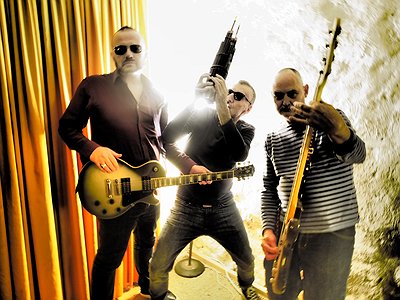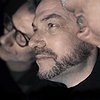Part 2
Could you take us through a day in your life, from a possible morning routine through to your work? Do you have a fixed schedule? How do music and other aspects of your life feed back into each other - do you separate them or instead try to make them blend seamlessly?
J&B
Getting up. Breakfast. Reading or listening to news. Writing. Aperitif. Lunch while watching an episode of a series or half a movie. Siesta. Writing. Walk with Pitou (with duly signed attestation). Aperitif. Dinner. Writing. Sleeping. Reading. More or less eventful night. Getting up. Aperitif. Siesta. Lunch while watching an episode of a series or half a movie. Sleep. Walk with Pitou. Aperitif. More or less eventful night. Writing. Reading or listening to news. Getting up. Decision to send the time synchronizer to the technical control (with duly signed attestation). Aperitif.
LP
Getting up early, reading, eating, going back to sleep, working in the studio, answering interviews... it all makes noise. Some of these noises can make my hair stand on end......... I love to cook too. There are a lot of very interesting cooking noises: from the sound of the knife cutting to the quivering of the onion in the oil... I listen to all that a lot.
PhP
Métro, boulot, dodo
Could you describe your creative process on the basis of a piece or album that's particularly dear to you, please? Where did the ideas come from, how were they transformed in your mind, what did you start with and how do you refine these beginnings into the finished work of art?
J&B
After having composed a lot with Palo Alto at the beginning of the band, I now work (for about fifteen years) essentially on improvisation by directly processing sounds (saxophone, voice, trombone, trumpet, etc...) via effect pedals. Philippe and Laurent do a much more constructed work by ensuring the rhythmic structures, the loops, which constitute the skeleton already more or less are furbished with tendon muscles and nerves on which instruments and freer sounds will be able to roam. Collective improvisations also always work very well.
LP
As I said before, sounds follow one another, no sound is to be banished. All the work consists in highlighting them in relation to each other, or just in relation to silence. But I'm not sure that silence exists.
PhP
Didn't John Cage say something like "In music, silence is the set of sounds not wanted by the composer"?
There are many descriptions of the ideal state of mind for being creative. What is it like for you? What supports this ideal state of mind and what are distractions? Are there strategies to enter into this state more easily?
J&B
Free the intuition, the unconscious, the improbable. Suspend incredulity.
LP
I'm an enjoyer. I am looking for nothing more than a permanent orgasm. It is this search that leads me to be creative.
PhP
I think that artists, in the broadest sense, are perpetually creative, but certain moments, certain situations, certain encounters are more inspiring than others and function as triggers. But, to answer your question more precisely, I think that Palo Alto works better in the rush than in the long run. Urgency allows us to deploy a collective energy that is generally quite productive and efficient.
How is playing live and writing music in the studio connected? What do you achieve and draw from each experience personally? How do you see the relationship between improvisation and composition in this regard?
J&B
As I already mentioned, I love live and collective improvisation in all its forms (more or less directed, more or less pre-structured). For a few years, Palo Alto operated entirely in this way: systematic recording of live performances, the selection of which resulted in the double album (CD + DVD) Terminal Sidéral. When a synergy, shot with adrenaline, settles on a preconceived electronic structure, the result is generally surprising and excessively gratifying. A careful post-production then allows to erase the slag and to bring to light the most "magic" moments.
LP
I'm not very attracted to playing live music. On stage, you often don't have enough time to really bring out the sounds of a moment. But as I like to be disturbed, this state of emergency allows me to get out of the comfort of the studio and find a kind of raw music that can be interesting at times.
PhP
Our music relies heavily on sound texture, effects, mixing and production. We spend a lot of time working on the sound and the construction of the tracks in the studio. The live versions are therefore alternative, more raw versions, with tracks arranged to leave room for improvisation.`
How do you see the relationship between the 'sound' aspects of music and the 'composition' aspects? How do you work with sound and timbre to meet certain production ideas and in which way can certain sounds already take on compositional qualities?
J&B
The saxophone, the voice, the trombone produce sounds, which the pedals orchestrate and harmonize. Meta-machine, meta-human composing together in complete freedom. The composition can be intuitive, raw, automatic and thus find its quintessence in the limit states that improvisation provides.
LP
I have already answered this question above...
PhP
Laurent, this answer is not valid.
Our sense of hearing shares intriguing connections to other senses. From your experience, what are some of the most inspiring overlaps between different senses - and what do they tell us about the way our senses work? What happens to sound at its outermost borders?
J&B
Synaesthetic or nothing.
LP
"In space, no one can hear you scream... "(Alien)
PhP
Very seriously, these two are devoted to this subject. It is a challenge to deal with it in an interview. The musical experience, or more broadly the sound experience, is multisensory. Devices exist to "feel" music/sound with sight or touch. I really like the visual experience with Styrofoam balls for example. It may be more complex with taste and smell, but I think there are studies. So, it's an exciting area because there are avenues to explore / experiment.
But going to the dressing rooms of certain venues or festivals allows us to affirm that rock music does have a smell...
Art can be a purpose in its own right, but it can also directly feed back into everyday life, take on a social and political role and lead to more engagement. Can you describe your approach to art and being an artist?
J&B
To define oneself, as an artist, troublemaker of established perception, is already in itself a political act.
LP
I'm not an activist at all... and yet I've very often participated in artistic actions organized by activists. I am also used to saying that all my work is political. But probably just as much as my way of doing (or not doing) the shopping at the supermarket or even brushing my teeth.
PhP
Palo Alto is not a committed band, but some people sometimes perceive our music as a political or militant act. Perhaps it is, unconsciously...
It is remarkable, in a way, that we have arrived in the 21st century with the basic concept of music still intact. Do you have a vision of music, an idea of what music could be beyond its current form?
J&B
All art aspires to the condition of music.
LP
For me music has not evolved at all from prehistory to the present day. And it's a good bet that it won't evolve any further by the end of time. It just puts us in contact with something unspeakable elsewhere.
PhP
What is its current form?






